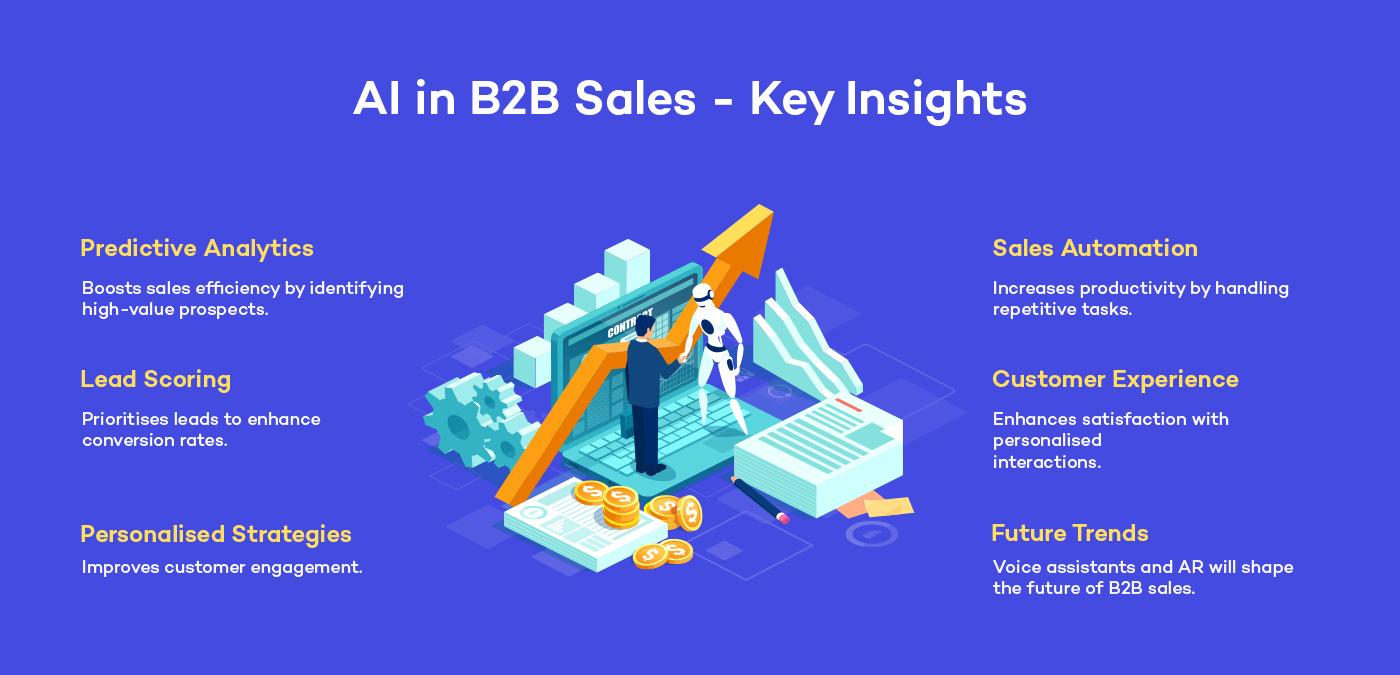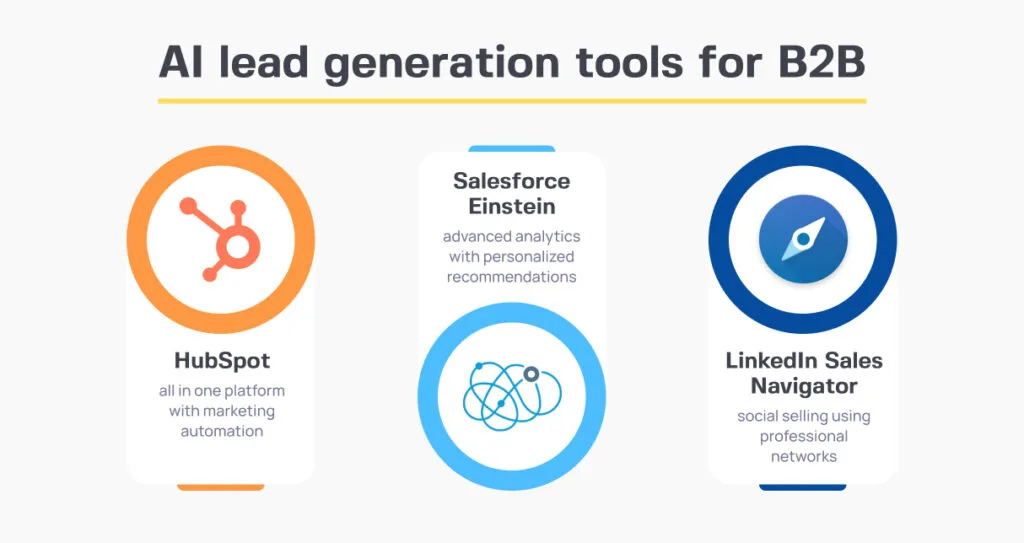Top benefits of AI Automation For B2B for B2B customer engagement
Revolutionize Your Service: Just How AI Automation Is Transforming B2B Operations
AI automation is improving B2B operations in considerable means. Firms are embracing this modern technology to streamline operations and improve effectiveness. As tasks become automated, businesses can concentrate on critical development instead of mundane procedures. The ramifications of these adjustments are profound, affecting every little thing from customer interactions to supply chain management. Recognizing this makeover is necessary, as the future of organization depend upon the efficient assimilation of AI into daily procedures. What exists in advance in this developing landscape?
Understanding AI Automation in B2B Context
As companies progressively seek performance, recognizing AI automation within the B2B context comes to be essential. AI automation refers to the application of synthetic intelligence technologies to improve and improve company processes. In B2B atmospheres, this can materialize in various forms, such as automating data access, enhancing supply chain logistics, or boosting stock administration. Organizations leveraging AI automation can decrease functional prices, decrease human mistake, and increase productivity. Moreover, AI devices can assess vast quantities of data to give actionable insights, making it possible for notified decision-making. The integration of AI right into B2B operations not only transforms typical operations however also cultivates agility and scalability, enabling organizations to adjust to market adjustments swiftly and successfully. Accepting this technology is necessary for staying affordable in today's digital landscape.
Enhancing Customer Experience Via AI
How can AI change customer interactions in the B2B market? AI enhances client experience by offering personalized, timely, and reliable solution. Virtual aides and smart chatbots can handle questions 24/7, making sure clients obtain immediate feedbacks. Predictive analytics enable organizations to expect consumer needs, customizing offerings accordingly. AI-driven systems can analyze customer information, allowing for targeted advertising approaches and enhanced interaction. In addition, sentiment analysis devices analyze customer comments, aiding organizations tweak their solutions. By automating regular jobs, AI frees up human resources to focus on high-value communications, cultivating more powerful relationships. The integration of AI not just simplifies interaction yet also builds depend on and loyalty, eventually boosting the total consumer experience in the affordable B2B landscape.
Streamlining Supply Chain Administration With AI
AI plays an important role in enhancing supply chain administration with predictive analytics and automated stock control (Minarik AI). By leveraging predictive analytics, services can expect need fluctuations and adjust their procedures as necessary. Automated supply systems further improve effectiveness by guaranteeing supply degrees are kept, decreasing waste and enhancing total performance

Anticipating Analytics Benefits
While lots of organizations face difficulties in taking care of complicated supply chains, anticipating analytics supplies a transformative remedy by leveraging large quantities of information to anticipate patterns and optimize procedures. By examining historical data together with real-time inputs, anticipating analytics enables firms to determine patterns and prepare for future demands. This insight enables even more enlightened decision-making, improving efficiency and reducing expenses. In enhancement, organizations can proactively address possible disturbances by predicting supply chain bottlenecks and changing approaches accordingly. The assimilation of anticipating analytics not just enhances supply management however additionally promotes stronger partnerships with distributors and clients via timely feedbacks to market changes. Inevitably, the fostering of anticipating analytics encourages companies to stay affordable in an increasingly vibrant company environment.
Automated Stock Control
As companies increasingly count on anticipating analytics to optimize supply chain procedures, automated supply control emerges as a powerful ally in this effort. By leveraging AI-driven innovations, firms can enhance accuracy in inventory monitoring, reduce stockouts, and decrease excess stock. Automated systems assess real-time information, permitting companies to predict need changes and readjust stock degrees as necessary. This not just streamlines order fulfillment but likewise enhances cash money flow administration by minimizing holding costs. Additionally, AI can recognize patterns in buying habits, allowing more enlightened decision-making concerning vendor partnerships and procurement methods. Ultimately, automated stock control not just boosts operational effectiveness but additionally boosts customer contentment by making sure item availability, solidifying its duty as a vital element in modern-day supply chain monitoring.
Data-Driven Decision Making Powered by AI
In today's competitive landscape, companies significantly rely upon data-driven decision-making to improve functional performance and strategic planning. Expert system plays a crucial role in this change by assessing vast amounts of data swiftly and precisely. AI algorithms determine patterns, patterns, and abnormalities that human experts may ignore, allowing organizations to make enlightened choices based upon real-time understandings - Minarik AI. This capacity allows business to forecast market changes, optimize resource allowance, and customize their offerings to consumer needs. Furthermore, AI-driven analytics promote threat assessment and management, making sure that companies can browse unpredictabilities efficiently. By leveraging these innovative devices, services not only improve their decision-making processes however likewise get a competitive benefit in their respective markets, fostering growth and innovation
Automating Repeated Tasks to Boost Productivity
Enhancing recurring jobs with automation considerably boosts performance within B2B procedures. By applying AI-driven options, firms can remove mundane activities such as information entrance, billing handling, and report generation. This shift permits employees to concentrate on higher-value jobs, cultivating creative thinking and critical reasoning. Automating these lengthy processes not just lowers human mistake however also accelerates operations effectiveness. Furthermore, companies can achieve regular results and enhanced precision, which is essential in preserving client fulfillment. The integration of automation devices allows organizations to allocate sources better, making sure that teams can react swiftly to market needs. Eventually, taking on AI for repeated jobs is a tactical move that changes operational abilities and drives overall organization growth.
Incorporating AI With Existing Business Processes
Several companies face obstacles when integrating AI with existing service processes. These obstacles usually come from a lack of comprehending pertaining to just how AI can match existing workflows. Successful assimilation requires a detailed assessment of existing operations to determine areas where AI can add value. Organizations needs to likewise assure that their teams are geared up with the needed skills to take advantage of AI devices properly - AI Automation For B2B. In addition, seamless combination pivots on the compatibility of AI modern technologies with legacy systems. Business usually find it valuable to embrace a phased approach, piloting AI applications in details divisions before a more comprehensive rollout. This technique enables modifications based upon preliminary comments, assuring smoother changes and optimizing the possible benefits of AI automation in improving efficiency and effectiveness
Future Patterns in AI Automation for B2B Business
As B2B companies seek to the future, improved data analytics is readied to play a critical function in driving decision-making processes. Intelligent procedure automation will certainly additionally become a crucial trend, boosting and enhancing operations effectiveness. These developments promise to improve exactly how organizations run, inevitably causing even more receptive and active organizations.
Improved Information Analytics
While services progressively rely on data-driven decisions, the duty of AI in improving information analytics is becoming more vital in B2B operations. AI modern technologies help with the collection and analysis of huge go datasets, allowing business to reveal beneficial understandings that drive critical planning. Predictive analytics powered by AI allows companies to forecast market patterns and client actions with better precision. Furthermore, equipment understanding formulas improve information interpretation, determining patterns that human analysts might neglect. This brings about more educated decision-making and optimized source appropriation. As B2B business proceed to accept AI-driven analytics, they can anticipate better functional effectiveness, boosted customer experiences, and an one-upmanship on the market. The future of information analytics in B2B pivots on integrating advanced AI abilities.
Smart Process Automation
Intelligent Process Automation (IPA) is poised to transform B2B procedures by seamlessly integrating AI technologies with conventional organization processes. This innovative approach combines robotic process automation (RPA) with sophisticated AI capacities, allowing companies to improve effectiveness and precision. Business can automate repeated tasks, such as data entry and invoice processing, allowing employees to concentrate on strategic initiatives. IPA also leverages machine understanding and natural language processing, boosting decision-making with real-time data analysis. As companies progressively adopt IPA, they can anticipate substantial price decreases and improved customer experiences. Future trends show a growing dependence on IPA for scalability and versatility, positioning organizations to thrive in an ever-evolving market. Welcoming IPA will certainly be necessary for maintaining competitiveness in the electronic age.
Regularly Asked Inquiries
What Industries Advantage The Majority Of From AI Automation in B2B Operations?

Just How Can Small Companies Implement AI Automation Properly?
Small companies can execute AI automation efficiently by identifying recurring jobs, picking appropriate tools, incorporating remedies slowly, educating personnel, and continually assessing performance to optimize procedures, taking full advantage of and ensuring a smooth changeover effectiveness.
What Are the Costs Linked With AI Automation Implementation?
The expenses connected with AI automation execution usually consist of software procurement, infrastructure upgrades, training team, recurring maintenance, and possible assessment charges. These expenditures can vary significantly based upon the scale and complexity of the automation services picked.
Just how Do I Determine ROI From AI Automation Initiatives?
To determine ROI from AI automation campaigns, one ought to examine price financial savings, efficiency improvements, and income growth against implementation expenses. Tracking vital performance signs with time provides valuable insights right into performance and total roi.
What Abilities Are Needed to Manage AI Automation Projects?
Effective management of AI automation jobs calls for abilities in job administration, data analysis, programs, and comprehending AI modern technologies. In addition, solid interaction, analytic capacities, and adaptability are vital for navigating the complexities of such initiatives.
As services significantly look for effectiveness, understanding AI automation within the B2B context ends up being crucial. The combination of AI into B2B procedures not just changes standard process but additionally fosters dexterity and scalability, permitting companies to adapt to market changes swiftly and properly. While services progressively depend on data-driven decisions, the duty of AI in improving data analytics is becoming more essential in B2B procedures - AI Automation For B2B. Smart Refine Automation (IPA) is poised to revolutionize B2B procedures by perfectly integrating AI technologies with standard company procedures. Efficient management of AI automation projects calls for skills in job administration, data analysis, programs, and comprehending AI technologies